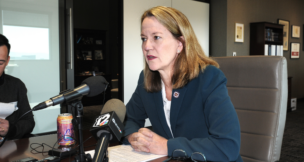$57M budget gimmick funnels federal DSH money to general fund
Arizona Capitol Reports Staff//February 11, 2009//[read_meter]
$57M budget gimmick funnels federal DSH money to general fund
Arizona Capitol Reports Staff//February 11, 2009//[read_meter]
The state budget passed in the early hours of Jan. 31 includes what some lawmakers have called an accounting trick to diminish the state's $1.6 billion deficit in fiscal 2009, saying the Legislature approved the budget revisions without understanding the ultimate cost.
"I don't think anybody on this committee understood really what we were doing with this cut," Sen. Barbara Leff, a Republican from Paradise Valley, said during a Feb. 11 Senate Healthcare and Medical Liability Reform Committee hearing. "This was a really bad policy move."
A budget line item that was backed by the Republican leadership in the House and Senate allows for the reallocation of state money to the general fund that had been earmarked for the Disproportionate Share Hospital (DSH) program, which provides money to public and private hospitals across the state to offset the costs of serving low-income patients.
Money originally allocated to the 100 private hospitals qualifying for DSH funds was eliminated when the budget was revised, causing the state to lose matching funds from the federal government.
Public hospitals, on the other hand, will be required to prove to the federal government that they lost revenue due to serving primarily low-income patients, triggering a lump-sum dispersal of federal funds. But instead of dispersing the federal dollars to the state's public hospitals, the Legislature intended to divert the money to the state's general fund.
Now, though, lawmakers will have an opportunity to reverse the decision if the Arizona Health Care Cost Containment Center (AHCCCS) is unable to receive approval for the cuts from the federal government.
Arizona hospitals providing care to Medicaid beneficiaries are reimbursed by AHCCCS for less than 85 percent of the cost of care, according to a study conducted in 2007 by the actuarial firm Milliman Inc.
Hospitals, which are required by federal law to treat patients under Medicaid, make up for the losses by increasing rates for patients with private insurance. The increase is known as the "hidden health care tax" and is a significant factor in rising insurance costs.
"It is not a tax that health plans and businesses pay directly, but they are very aware that a leading cause of the higher health care premiums is AHCCCS underpayment," said Laurie Lyles, senior vice president of public affairs for the Arizona Hospital and Healthcare Association.
The hidden health care tax adds an additional strain on "safety hospitals," which primarily serve low-income or uninsured patients because a smaller pool of privately insured patients limits the hospitals' ability to shift the costs of uncompensated care.
To help safety hospitals receive a larger percentage of costs incurred by providing care for low-income patients, Congress approved the Omnibus Budget Reconciliation Act in 1981, which provides states the opportunity to collect approximately $2 from the federal government for every $1 the state pays to safety hospitals, in addition to standard Medicaid payments.
Arizona began collecting DSH matching funds a decade later.
Both private and public hospitals serving mostly low-income patients receive compensation funds, but the paths vary dramatically when it comes to receiving those funds and the impact they have on the state's bottom line.
State money designated for private hospitals, just more than $8.8 million annually, is distributed based on the number of Medicaid patients each hospital treats. The money is allocated to AHCCCS in the state's annual budget, and it triggers more than $17 million from the federal government.
St. Joseph's Hospital and Medical Center in Phoenix received $4.6 million to compensate for lost revenue in 2008, the largest portion of any Arizona hospital.
The only two public hospitals that receive DSH funds are the Arizona State Hospital and the county-owned Maricopa Integrated Health System. Both are required to document the costs of uncompensated care and account for the lost revenue to the Centers for Medicare and Medicaid Services prior to certification, which results in the drawdown of federal matching funds.
Money designated for the Arizona State Hospital was not included in the list of cuts in the fiscal 2009 budget revision.
The Maricopa Integrated Health System certified $89.9 million in lost revenue from Medicaid patients in 2008, and triggered the release to Arizona of approximately $57 million in federal funds.
An agreement with CMS allows Arizona to distribute a portion of the federal DSH money to the hospitals and deposit the remainder in the general fund. In 2008, the Maricopa Integrated Health System received $4.2 million.
The state does not contribute money to the Maricopa Integrated Health System, which includes one hospital, 12 health centers and a psychiatric facility. The system receives about $40 million from a property tax passed by voters in 2003 to help cover operating costs.
The state's participation in DSH payment programs resulted in a windfall of $53 million to the general fund in 2008.
Revisions to the fiscal 2009 budget eliminated the state's contribution of $8.8 million to private hospitals and redirected to the general fund all federal matching money that was intended to help the Maricopa Integrated Health System cover a portion of its estimated $40 million shortfall in fiscal 2009.
The state was hoping to cut back on expenses while still making a profit of more than $57 million in federal funds, a move that led Sen. Paula Aboud, a Democrat from Tucson, to question the state's priorities.
"The state is keeping all it wants, but we are not taking care of our low-income population," Aboud said in the committee hearing.
Hospital administrators across the state said the elimination of DSH funds at a time when more people are joining Medicaid might force hospitals to cancel programs or make changes to patient-to-staff ratios.
"It is very difficult to build programs for the future when you have funding cycles that go from feast to famine," said Bob Meyer, chief executive officer for Phoenix Children's Hospital. "This lack of stability is the single most concerning issue I have."
Sen. John Nelson, a Republican from Glendale, said he was concerned that hospitals might have to shut down in the face of budget deficits.
"Hospitals provide all the services for Medicaid patients," Nelson said in the committee hearing. "If they have to start shutting down programs, maybe we could put hospital beds in the House and Senate."
And Linda Hunt, president of St. Joseph's Hospital and Medical Center in Phoenix, said the state should be taking advantage of collecting federal matching funds, not sacrificing the money by cutting payments to private hospitals.
"If you need budget financing, leveraging the federal dollars is a very good way to do that because other state programs don't have that match. If we leveraged those federal dollars, it might have made things easier for everyone in the state," Hunt said. "It is a huge missed opportunity."
The budget has passed, but the governor's signature will not be enough to guarantee the passage of the line item. An agreement between the state and CMS requires federal approval of the cost-saving maneuver.
The agreement requires the state to provide at least $5,000 to each qualifying hospital. Officials at AHCCCS said they have submitted a written request that would amend the total payments to private hospitals from the existing $26.1 million in state and federal funds to $500,000, the minimum needed to make payments to the state's 100 qualifying hospitals.
If approved, AHCCCS would shuffle department funds lon
g enough to collect the $500,000 in federal funds, which would be dispersed to only private hospitals.
CMS is expected to make a decision on the amendment by April, but officials at AHCCCS said it is unlikely the federal agency will approve the cuts.











